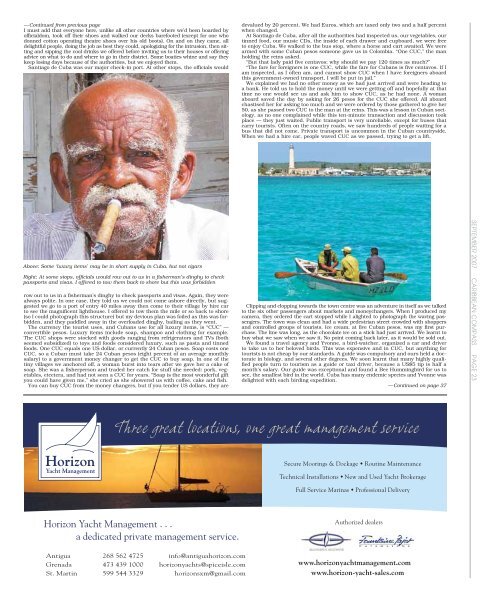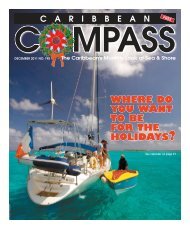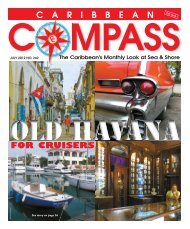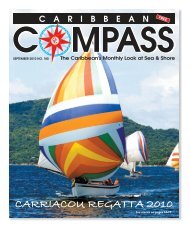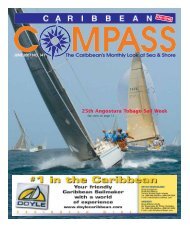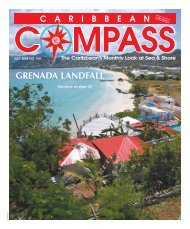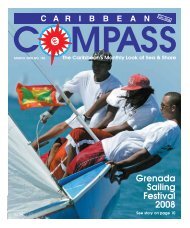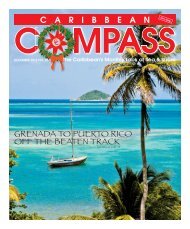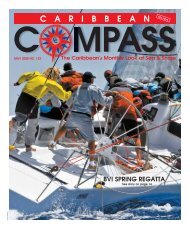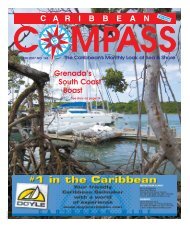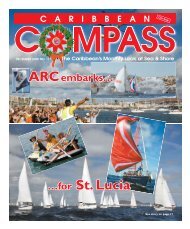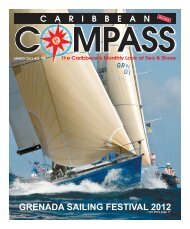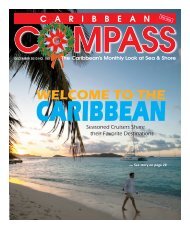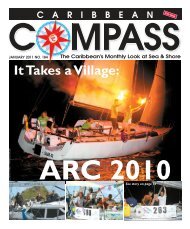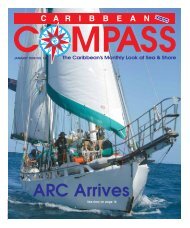Carriacou Regatta Festival 2007 - Caribbean Compass
Carriacou Regatta Festival 2007 - Caribbean Compass
Carriacou Regatta Festival 2007 - Caribbean Compass
You also want an ePaper? Increase the reach of your titles
YUMPU automatically turns print PDFs into web optimized ePapers that Google loves.
—Continued from previous page<br />
I must add that everyone here, unlike all other countries where we’d been boarded by<br />
officialdom, took off their shoes and walked our decks barefooted (except for one who<br />
donned cotton operating theatre shoes over his old boots). On and on they came, all<br />
delightful people, doing the job as best they could, apologizing for the intrusion, then sitting<br />
and sipping the cool drinks we offered before inviting us to their houses or offering<br />
advice on what to do and where to go in their district. Some boaties whine and say they<br />
keep losing days because of the authorities, but we enjoyed them.<br />
Santiago de Cuba was our major check-in port. At other stops, the officials would<br />
Above: Some ‘luxury items’ may be in short supply in Cuba, but not cigars<br />
Right: At some stops, officials would row out to us in a fisherman’s dinghy to check<br />
passports and visas. I offered to tow them back to shore but this was forbidden<br />
row out to us in a fisherman’s dinghy to check passports and visas. Again, they were<br />
always polite. In one case, they told us we could not come ashore directly, but suggested<br />
we go to a port of entry 40 miles away then come to their village by hire car<br />
to see the magnificent lighthouse. I offered to tow them the mile or so back to shore<br />
(so I could photograph this structure) but my devious plan was foiled as this was forbidden,<br />
and they paddled away in the overloaded dinghy, bailing as they went.<br />
The currency the tourist uses, and Cubans use for all luxury items, is “CUC” —<br />
convertible pesos. Luxury items include soap, shampoo and clothing for example.<br />
The CUC shops were stocked with goods ranging from refrigerators and TVs (both<br />
seemed subsidized) to toys and foods considered luxury, such as pasta and tinned<br />
foods. One CUC equals one US dollar, or currently 24 Cuban pesos. Soap costs one<br />
CUC, so a Cuban must take 24 Cuban pesos (eight percent of an average monthly<br />
salary) to a government money changer to get the CUC to buy soap. In one of the<br />
tiny villages we anchored off, a woman burst into tears after we gave her a cake of<br />
soap. She was a fisherperson and traded her catch for stuff she needed: pork, vegetables,<br />
etcetera, and had not seen a CUC for years. “Soap is the most wonderful gift<br />
you could have given me,” she cried as she showered us with coffee, cake and fish.<br />
You can buy CUC from the money changers, but if you tender US dollars, they are<br />
Horizon<br />
Yacht Management<br />
Horizon Yacht Management . . .<br />
a dedicated private management service.<br />
Antigua<br />
Grenada<br />
St. Martin<br />
Three great locations, one great management service<br />
268 562 4725<br />
473 439 1000<br />
599 544 3329<br />
info@antiguahorizon.com<br />
horizonyachts@spiceisle.com<br />
horizonsxm@gmail.com<br />
devalued by 20 percent. We had Euros, which are taxed only two and a half percent<br />
when changed.<br />
At Santiago de Cuba, after all the authorities had inspected us, our vegetables, our<br />
tinned food, our music CDs, the inside of each drawer and cupboard, we were free<br />
to enjoy Cuba. We walked to the bus stop, where a horse and cart awaited. We were<br />
armed with some Cuban pesos someone gave us in Colombia. “One CUC,” the man<br />
holding the reins asked.<br />
“But that lady paid five centavos; why should we pay 120 times as much?”<br />
“The fare for foreigners is one CUC, while the fare for Cubans is five centavos. If I<br />
am inspected, as I often am, and cannot show CUC when I have foreigners aboard<br />
this government-owned transport, I will be put in jail.”<br />
We explained we had no other money as we had just arrived and were heading to<br />
a bank. He told us to hold the money until we were getting off and hopefully at that<br />
time no one would see us and ask him to show CUC, as he had none. A woman<br />
aboard saved the day by asking for 26 pesos for the CUC she offered. All aboard<br />
chastised her for asking too much and we were ordered by those gathered to give her<br />
50, as she passed two CUC to the man at the reins. This was a lesson in Cuban sociology,<br />
as no one complained while this ten-minute transaction and discussion took<br />
place — they just waited. Public transport is very unreliable, except for buses that<br />
carry tourists. Often on the country roads, we saw hundreds of people waiting for a<br />
bus that did not come. Private transport is uncommon in the Cuban countryside.<br />
When we had a hire car, people waved CUC as we passed, trying to get a lift.<br />
Clipping and clopping towards the town centre was an adventure in itself as we talked<br />
to the six other passengers about markets and moneychangers. When I produced my<br />
camera, they ordered the cart stopped while I alighted to photograph the waving passengers.<br />
The town was clean and had a wide pedestrian street crowded with shoppers<br />
and controlled groups of tourists. Ice cream, at five Cuban pesos, was my first purchase.<br />
The line was long, as the chocolate ice on a stick had just arrived. We learnt to<br />
buy what we saw when we saw it. No point coming back later, as it would be sold out.<br />
We found a travel agency and Yvonne, a bird-watcher, organized a car and driver<br />
to take us to her beloved birds. This was expensive and in CUC, but anything for<br />
tourists is not cheap by our standards. A guide was compulsory and ours held a doctorate<br />
in biology, and several other degrees. We soon learnt that many highly qualified<br />
people turn to tourism as a guide or taxi driver, because a US$5 tip is half a<br />
month’s salary. Our guide was exceptional and found a Bee Hummingbird for us to<br />
see, the smallest bird in the world. Cuba has many endemic species and Yvonne was<br />
delighted with each birding expedition.<br />
—Continued on page 37<br />
Secure Moorings & Dockage � Routine Maintenance<br />
Technical Installations � New and Used Yacht Brokerage<br />
Full Service Marinas � Professional Delivery<br />
Authorized dealers<br />
www.horizonyachtmanagement.com<br />
www.horizon-yacht-sales.com<br />
SEPTEMBER <strong>2007</strong> CARIBBEAN COMPASS PAGE 23


